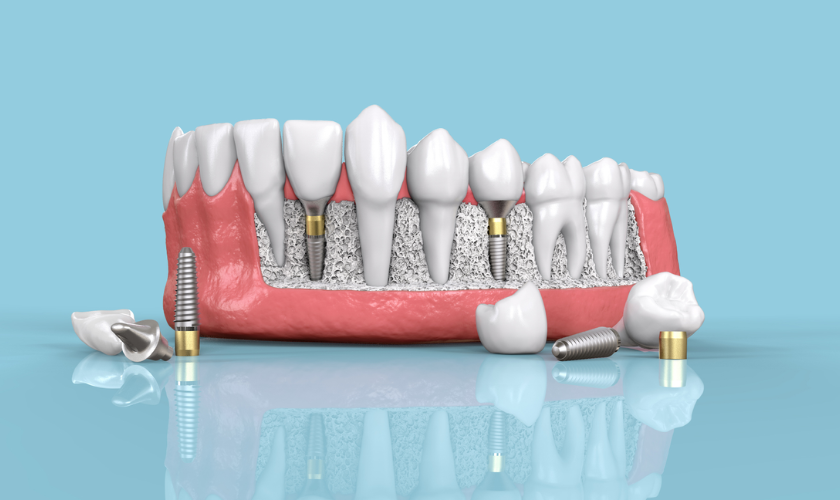Dental care is fundamental to maintaining overall health. Good oral hygiene practices can prevent many dental problems, such as cavities, gum disease, and tooth loss. Furthermore, advancements in dental technology have made it possible to replace lost or damaged teeth with dental implants problems. However, while dental implants offer a lasting solution, they come with their own set of challenges. Understanding how to care for your teeth, both natural and implanted, can go a long way in preventing issues and ensuring long-term oral health.
Importance of Oral Hygiene
Maintaining good oral hygiene is the first step toward preventing dental problems. Proper brushing, flossing, and regular dental check-ups help remove plaque and bacteria that can lead to gum disease, cavities, and other oral health issues.
Brushing
Dental Care Brushing your teeth at least twice a day is crucial for preventing plaque buildup, which can lead to cavities and gum disease. It’s important to use the right technique and tools. A soft-bristled toothbrush is recommended, as it is gentle on both teeth and gums. The angle of your brush should be at 45 degrees to your gum line, and you should use circular motions to gently scrub each surface of your teeth. It’s also essential to replace your toothbrush every three to four months, or sooner if the bristles become frayed.
Using a fluoride toothpaste can help strengthen enamel and protect against cavities. Fluoride is a mineral that helps remineralize weak spots in the enamel, reducing the risk of decay. Be mindful of how much toothpaste you use; a pea-sized amount is sufficient for each brushing session.
Flossing
Flossing is an often overlooked but vital part of oral care. Brushing alone cannot reach the tight spaces between your teeth, where plaque and food particles can accumulate. Flossing helps remove debris in these spaces and reduces the risk of cavities and gum disease. It’s best to floss at least once a day, ideally before bedtime.
When flossing, gently slide the floss between your teeth, curving it around each tooth to form a C shape. Avoid snapping or forcing the floss, as this can damage your gums. If you’re not comfortable with traditional floss, consider using floss picks or an interdental brush.
Mouthwash
Mouthwash can be an effective adjunct to brushing and flossing, particularly when it comes to reducing bacteria and freshening breath. Look for an antimicrobial mouthwash that contains fluoride, as it can help in the fight against cavities and gum disease. Avoid alcohol-based mouthwashes, as they can dry out the mouth and cause irritation.
Regular Dental Check-ups
Even with a rigorous at-home routine, regular visits to the dentist are essential for maintaining good oral health. A dentist can detect early signs of decay, gum disease, or other issues that might not be visible to the untrained eye. Professional cleanings are also necessary to remove tartar, a hardened form of plaque that cannot be eliminated by brushing alone.
The American Dental Association recommends seeing your dentist every six months for routine check-ups and cleanings. However, if you have specific issues like gum disease, you may need to visit more frequently.
Diet and Oral Health
What you eat plays a significant role in your dental health. A balanced diet can help protect your teeth, while poor nutrition can contribute to tooth decay and other oral health issues.
Foods to Eat for Healthy Teeth
- Dairy Products: Milk, cheese, and yogurt are rich in calcium and phosphates, which help strengthen enamel. These foods also stimulate saliva production, which neutralizes acids in the mouth and helps protect against cavities.
- Fruits and Vegetables: Raw fruits and vegetables like apples, carrots, and celery can act as natural toothbrushes, helping to clean teeth and stimulate saliva flow. They are also high in fiber, which aids in overall digestion and promotes oral health.
- Nuts: Nuts like almonds and walnuts are packed with healthy fats and minerals that support strong teeth and gums. They also require a lot of chewing, which can help clean teeth naturally.
- Green Tea: Green tea contains antioxidants and compounds that can reduce inflammation and fight bacteria in the mouth, lowering the risk of gum disease and bad breath.
Foods to Avoid for Healthy Teeth
- Sugary Snacks: Sugar is a primary cause of tooth decay. Bacteria in your mouth feed on sugar and produce acids that erode tooth enamel. It’s important to limit the intake of sugary foods and drinks, especially between meals.
- Acidic Foods: Citrus fruits and other acidic foods can erode tooth enamel over time. If you consume acidic foods, it’s best to rinse your mouth with water afterward to neutralize the acids.
- Sticky Foods: Foods that are sticky, like candy or dried fruits, can cling to your teeth, making it difficult to remove plaque and food particles. If you do indulge, be sure to brush afterward.
- Carbonated Drinks: Sodas and other sugary carbonated drinks can contribute to tooth decay, and their acidic content can also weaken enamel. Even diet sodas can pose risks due to their acidic nature.
Smoking and Oral Health
Smoking has a detrimental effect on oral health. It can lead to gum disease, tooth loss, bad breath, and oral cancer. Smoking also stains teeth, and it can interfere with the healing process after dental procedures, including implants.
If you are a smoker, quitting is one of the most important steps you can take to improve your oral health. Talk to your dentist for strategies to help you quit, and take advantage of resources like nicotine replacement therapies and support groups.
Dental Implants: Overview
Dental implants are artificial tooth roots placed into the jawbone to support a replacement tooth or bridge. They offer a durable and aesthetic solution for individuals who have lost teeth due to injury, decay, or other reasons. Implants are made from biocompatible materials like titanium, which allows them to fuse with the jawbone in a process called osseointegration.
Dental implants offer several advantages over traditional dentures or bridges, including improved comfort, better function, and a more natural appearance. However, they are not without their challenges, and some common issues may arise.
Common Dental Implant Issues
1. Implant Failure
Implant failure occurs when the implant does not properly integrate with the bone. This can result in the implant loosening or failing to function as intended. There are several reasons why an implant might fail:
- Infection: An infection can occur at the site of the implant, preventing proper healing.
- Insufficient Bone Density: If there is not enough bone to support the implant, it may not fuse properly with the bone.
- Excessive Stress: Overloading the implant with too much force (such as from teeth grinding or improper bite) can cause it to fail.
If you experience implant failure, your dentist may recommend removing the implant, allowing the area to heal, and then considering a new implant or alternative treatment.
2. Gum Recession Around Implants
One common issue with dental implants is gum recession, which occurs when the gum tissue around the implant pulls away from the base. This exposes the metal of the implant and can lead to sensitivity, infection, or aesthetic concerns. Gum recession around implants is more likely to occur in smokers or individuals with poor oral hygiene.
To prevent gum recession, it’s essential to maintain proper oral care. If recession does occur, a gum graft or other restorative procedure may be necessary to restore the area.
3. Peri-implantitis
Peri-implantitis is an infection that affects the tissues around the dental implant. Similar to gum disease, it causes inflammation, bleeding, and bone loss around the implant. The most common cause of peri-implantitis is poor oral hygiene, which leads to plaque and bacteria buildup around the implant.
To reduce the risk of peri-implantitis, it’s important to maintain excellent oral hygiene and attend regular dental check-ups. If peri-implantitis is detected, your dentist may recommend cleaning the implant, using antibiotics, or, in severe cases, removing the implant.
4. Nerve Damage
Nerve damage can occur during the implantation process if the implant is placed too close to a nerve. This can result in numbness, tingling, or pain in the lips, gums, or chin. Nerve damage is rare but can be a serious complication. It is important to consult with a highly trained implant specialist who will carefully assess your anatomy before placing the implant.
5. Implant Overloading
Implant overloading occurs when too much force is applied to the implant, either due to a misaligned bite or excessive pressure from chewing or grinding. This can lead to implant failure, loosening, or damage to surrounding bone structures.
To avoid implant overloading, your dentist may suggest using a nightguard to prevent grinding and ensuring that your bite is properly aligned.
Conclusion
Taking care of your teeth is essential for long-term oral health. Proper brushing, flossing, and regular visits to the dentist can help prevent many common dental problems. For those who have lost teeth, dental implants offer a reliable and effective solution, though they come with their own set of challenges. By understanding common implant issues and how to care for both natural and implanted teeth, you can ensure that your smile remains healthy for years to come.


